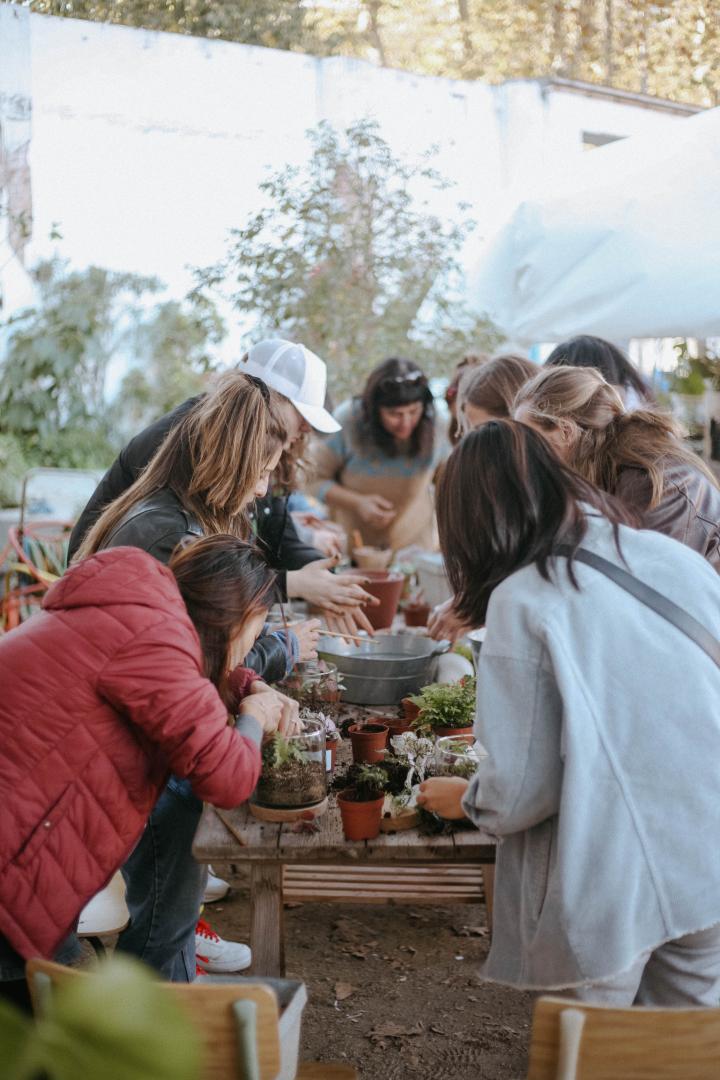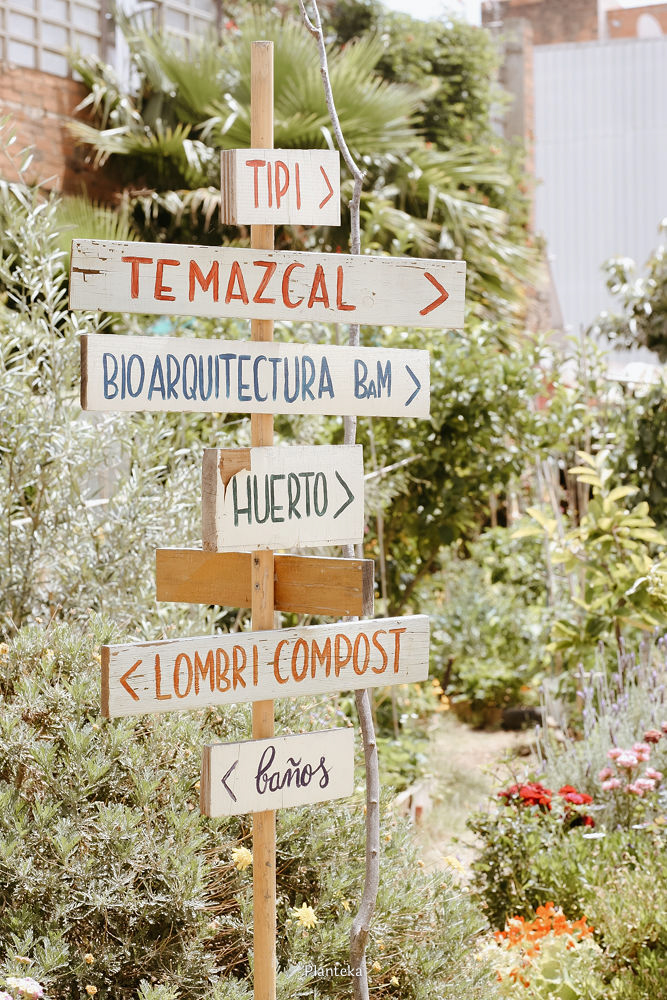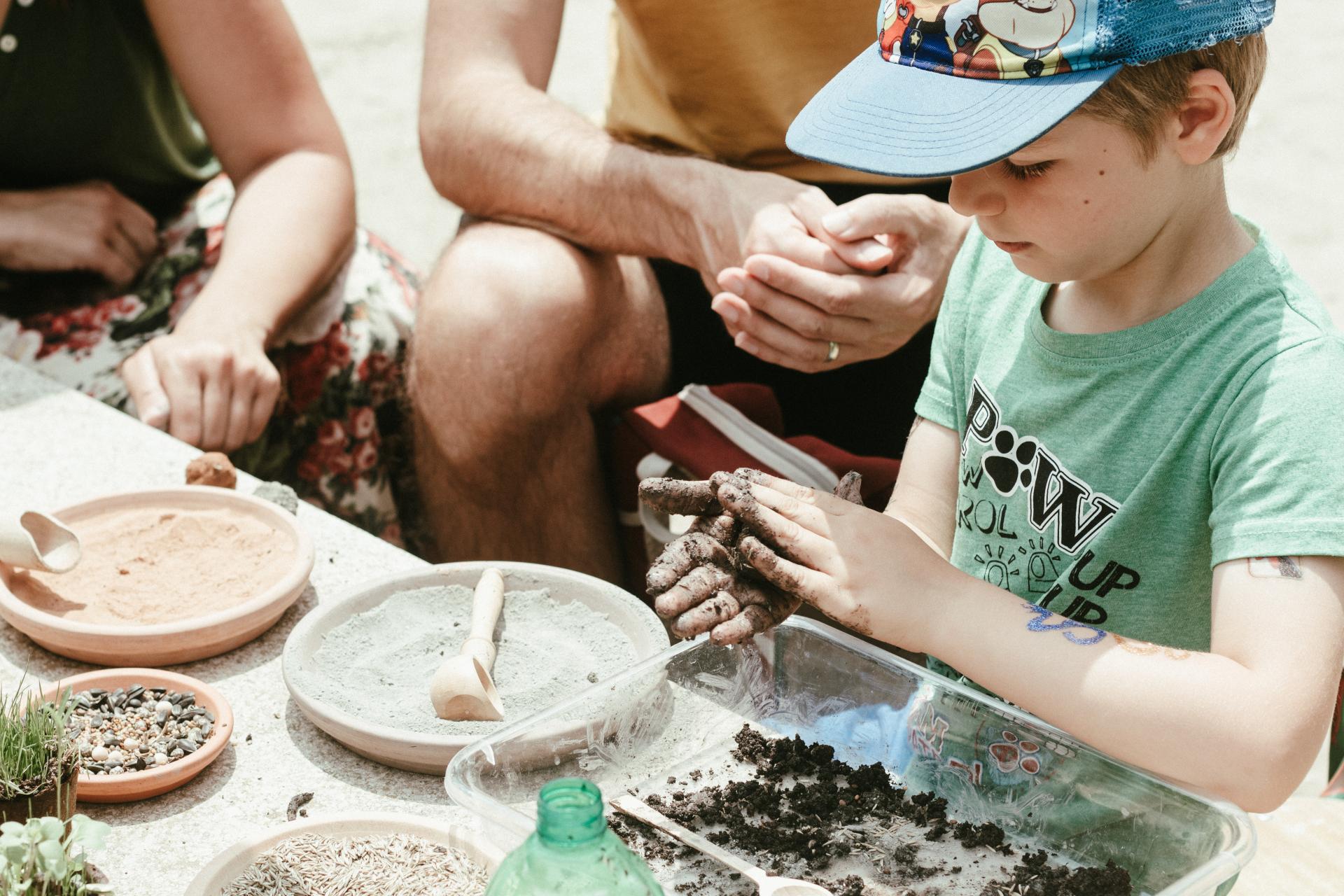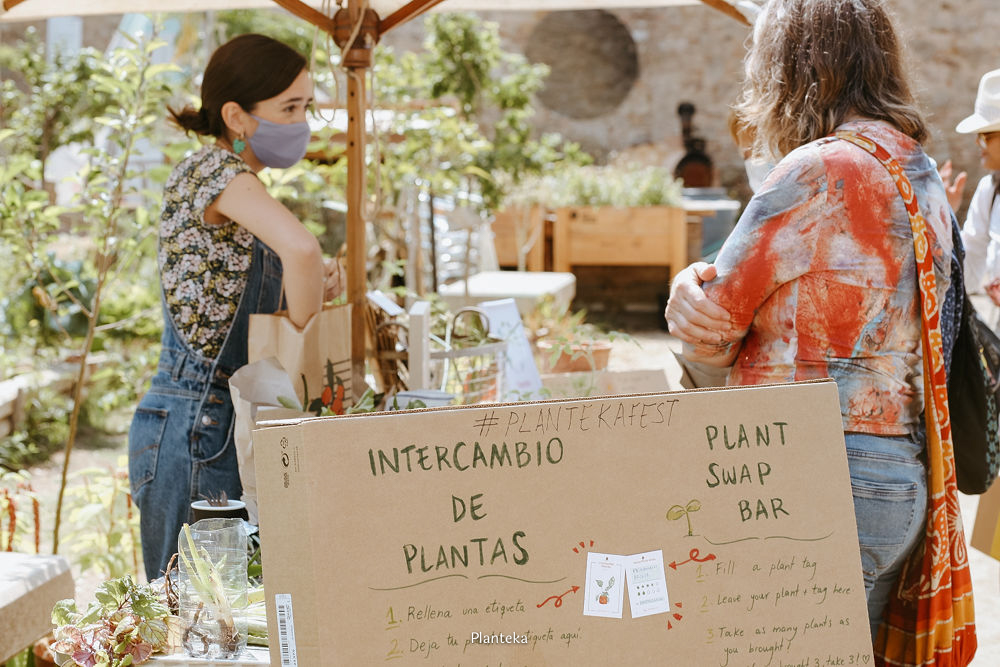PlantekaFest
Basic information
Project Title
Full project title
Category
Project Description
Planteka is an online marketplace to buy and sell plants, gardening services and knowledge on plants and sustainability, by connecting and mobilising a community of plant lovers. Recognising the growing need for inter-human and natural connections in the pandemic era, we created PlantekaFest; a unique festival facilitating the interconnectivity between humans and nature in urban environments, through the medium of plants, arts and sustainability.
Geographical Scope
Project Region
Urban or rural issues
Physical or other transformations
EU Programme or fund
Which funds
Description of the project
Summary
PlantekaFest was created as a real life replica of the online community and marketplace that is Planteka. It is a unique festival for plant lovers, to help reconnect with people and nature in our hyper-individualized urban lifestyles.
Objectives:
- Establish a sense of belonging among community members, who were connected by their love for plants and who up until then knew each other only as Instagram handles. We wanted to research and establish behaviour patterns of these community members, in a real life socio-environmental festival.
- Ensure that individuals reconnect with plants and nature within the concrete jungles of Barcelona and change behaviour to connect with nature in their daily lives.
- Explore the impact of a solidarity economy as opposed to a conventional online marketplace, where vendors support each other in selling each other’s products.
Implementation: For two weekends in the Spring and Autumn of 2021, we transformed a community garden in Barcelona and brought together community members with different ethnicities, languages and ages, all united by their love for plants.
Activities and Results:
- Free plant swaps, which became the meeting point for cultural and knowledge exchange on various plants.
- Educational workshops: Plants, arts and sustainability oriented workshops understanding the use of plants in our daily lives, from natural dyeing to vermicomposting. Bringing together various permacultural and environmental collectives in Barcelona, we imparted knowledge on sustainability and created a common purpose for the community.
- Shared community market space where vendors actively helped in setting up each other’s products and were equally responsible for selling them. This developed a sense of support and cooperation among vendors.
- Mindfulness practices using plants, helping individuals reconnect with self and the community.
- Interactive social games designed and delivered for maximum inter-cultural and inter-generational interaction.
Key objectives for sustainability
Our objectives while bringing together a community where they felt they belong were:
A) Education on sustainability, zero waste and circular economy for the community of plant lovers through
- Zero waste festival experience design and operation: a) From upcycled banners and plantable business cards to food served in compostable banana leaves. b) The community garden for the fest was chosen in a way that the members understood sustainability practices from their vermicomposting lab to sustainable toilet systems. c) Plant swaps for zero waste in the world of plants. We noticed behaviour changes where people brought big potted plants to the swap for members to benefit from them, which otherwise would have been trashed.
- Specific themes for workshops: Spring - Parts of a plant (Roots, Shoots and Flowers/Fruits and Autumn - Lifecycle of a plant (Sow, Grow, Slow/Conserve). Using this approach, individuals could relate to circularity. For example, we had sustainability workshops on making seed bombs for native plants to sow the seeds, basic hydroponics to grow plants easily and vermicomposting workshop making use of parts of plant to conserve so that they serve back as food for the seeds or plants.
- Free workshops like people-plant interaction workshop on understanding the importance of native plants and workshop to demonstrate the importance of soil health.
- Ecological healing through healing of relationships with self and individuals in the society, using mindfulness with plants workshop. This approach was exemplary in helping participants reconnect with themselves first, to their plants and immediate surroundings, to the community and to their larger environment - the planet.
B) Cooperation between individuals and associations working separately, but with a common vision for a sustainable planet. At PlantekaFest, we brought together associations like ConnectHort, Zero Waste BCN, AbonoKm0, Balconnect and Ecohuertos Urbanos.
Key objectives for aesthetics and quality
Our main objective in terms of aesthetics and quality of experience were:
A) Maximum interaction between people and plants (in the community garden), while ensuring socio-cultural exchanges within the community members through:
- Space design: We designed the flow of the festival by having a treasure hunt to start with exploring the plants in the community garden. The questions were designed to not only understand plants and where food came from, but also biocultural elements with questions on mythology and use of plants in various cultures. We noticed the behaviour pattern where we had inter-generational members taking part together in finding the plants out, a moment to share stories on plants whether they were 6 or 60, while connecting with nature at the same time. Following the treasure hunt, people naturally moved to the free plant swap area. This was the main community interaction point, where the socio-cultural exchanges happened within the community, despite differences in language, age, religion or ethnicities. Further alluding to the sense of belonging, plant swaps also were exemplary with a “plant parent” system, so that individuals could update each other on the progress of plants they received at the swap.
- Music and Art: Irradia Sonora, one of the collectives who collaborated with Planteka, explored ambient plant music to be played for the plants. We also had a micro-terrarium installation encouraging community interactions.
B) Education on organic use of plants in creating art. Following the fest themes, we had workshops like creating natural dyes and paints from flowers and other parts of plants, creating a jungle in a jar with terrarium and a free kokedama workshop. We established a pattern between love for plants and arts, where individuals in the community were enthusiastic about participating in DIY workshops. We also received testimonials on how they regained a sense of belonging, doing these activities together.
Key objectives for inclusion
Our key objectives in terms of inclusion were to:
A) Promote the ethos of Planteka, which signifies being unified by plants. Inclusivity is the essence of PlantekaFest, where everyone gains a sense of belonging with each other, with no gender, sex, language, age or ethnicity bias, but are brought together for their love of plants and nature. We achieved this through:
- Festival Design: Planteka community members, whether vendors, collaborators or customers, were equally involved from the start in designing and setting up the space. We had members from Korea to Venezuela, working together as a team to build the festival space in the heart of Barcelona.
- Accessibility for All: We ensured free entry for everyone for our first festival in Spring and a minimal fee for our Autumn edition, which was used in the maintenance of the community garden, thus making it affordable for everyone.
- Education for All: We also had multiple art and sustainability workshops like seed bombs, soil health, kokedama and people-plant interaction workshops for free, thus making it accessible and educational for all.
- Socio-cultural exchange: The plant swap space was an opportunity for language and socio-cultural exchange, where the maximum interaction happened whether you were someone from a remote spot in Cataluña or an American expat. With plants as the medium of exchange, there was a connection established naturally. Individuals exchanged knowledge on plants from their home countries, while also learning about native plants and their importance, thus providing an open platform for biocultural exchanges and discussions on culture and traditions.
B) Promote solidarity economy.
- Community market space: Providing equal opportunities for the local and small business vendors in Planteka community, where every member was equally responsible for selling each other's products.
- Further cooperation with members volunteering for the community garden, while they benefit from being in nature.
Results in relation to category
Attributing to the sense of belonging that we were able to create while reconnecting with people and nature in urban environments, we noticed a clear impact and improvement in both citizen and vendor involvement, for the Spring and Autumn Editions.
- For our Spring edition, we had a footfall of nearly 250 individuals which improved by 60% to a footfall of around 400 members from our community both as collaborators and participants.
- The solidarity economy approach was successful as well with nearly 75% increase from 15 vendors and workshop collaborators in Spring edition to 26 in Autumn edition of PlantekaFest, with more vendors interested in the community market space.
- The willingness to set up and support the community market space had an impact not only during the event, but also online where the behaviour change was noticeable as more vendors shared each other’s social media posts thus promoting a collaborative economy to sell each other’s plants and products.
- 8 in 10 people said that engaging with the community in real life was the favourite part of the festival experience, closely followed by interest in plant swaps and being in the community garden space as opposed to a conventional market fair set up.
- 6 in 10 people said they reconnected with the community members post the festival, thus enhancing a sense of belonging. These members were also open to more collaborations and support for Planteka community events.
Following PlantekaFest, we have been using these principles of reconnection and sense of belonging through plants with events like nature walks in city parks, art night with plants and regular plant swaps, where our main objective is for individuals to connect with each other and nature.
How Citizens benefit
Planteka is a 3 member team, with 2 of them working pro-bono for the organisation. As a startup, the involvement of citizens and civil society was crucial in the successful delivery of PlantekaFest. This model of social and solidarity economy is what we envision to scale globally, starting with grassroots changes in the way we look at for-profit organisations.
The citizens and civil society were involved in the design of the festival space. We had individuals join days before the fest to help with making the banners and set up the market and workshops stands. They were also equally involved in promoting the festival on social media.
On the days of PlantekaFest, members volunteered to share their responsibility for being at the community market space. Following a solidarity economy approach, every vendor was equally responsible for selling each other’s plants and products.
We had related non-profit organisations like “Los Angeles del Raval”, a charity for animals, participating and offering support in taking care of kids’ activities, in exchange for promotion of their organisation.
The plant swap area was also run by one of our community members, where the collaborator facilitated the sharing of plants and plant care knowledge among each other.
Benefits:
For the community and citizens: The members who were involved in the building together of the space formed close relationships among each other. We were clearly able to establish a behaviour pattern: the mobilisation of individuals united by a common interest, where they have a real sense of belonging.
For the community garden: The benefits received with citizen involvement was also long term for ConnectHort, the community garden where we held PlantekaFest. They received more volunteers to maintain the garden from members and the neighbourhood community who participated in the event, who were previously unaware of the garden in an urban space.
Physical or other transformations
Innovative character
The innovative character of PlantekaFest is in using plants as the medium for regaining a sense of belonging, in a disconnected and highly polarised world. We recognised behaviours especially during the pandemic, where people were isolated and had difficulties interacting and reengaging in real life. At the fest, we were able to bring together our online community of plant lovers to a community garden, where they could interact with both nature and people. Through an intentional use of art, sustainability, space and interaction design, we were able to break the barriers and help individuals reconnect. The community garden space and interaction designs through plant swaps and social games addressed the challenge that would have been for a conventional marketplace where interactions happen usually in isolated pockets.
As for the socio-economic aspect, currently we are experiencing a mainstream disconnect between for-profit commercial enterprises in gardening and non-profit ecological associations. This is what we see in mainstream plant markets or ecological festivals in that line. What we achieved at PlantekaFest using a solidarity economy approach was a balance of commercial and activist angle of these organisations; i.e. to say that Plantekafest business model was innovative.
Additionally we established a behaviour pattern where we saw we could drive social and economic benefit through plant swaps at local shops and community gardens in Barcelona. We tested this further by replicating the idea of plant swaps at a local coffee kiosk and in another community garden. The sales increased by 50% at the kiosk and the Instagram following for the community garden grew by nearly 30% for the community garden, just by bringing the neighbourhood community together through the activity of plant swap. It was also evident how creating this sense of belonging and community was important in growing local economies, small businesses and social enterprises.
Learning transferred to other parties
There are 4 key aspects of PlantekaFest that can be transferred to interested parties:
- Building and promotion of ECoCs, through plants and arts as the medium for socio-cultural exchanges: Be it sharing knowledge about growing and preserving native plants of Cataluña, orchids in Venezuela or turmeric plants in India, plants are a great medium of socio-cultural exchange and in creating a sense of belonging.
- Walking the talk on sustainability from the design and operation of the festival to imparting knowledge through workshops: Everything matters when it comes to climate action, and that involves clearly communicating to members about generating zero waste at the festival to imparting knowledge through workshops on how to better take care of the environment.
- Ecosystemic approach to improve local economy: We have seen that plants can create a sense of belonging and feeling of community. We also know that online communities have the power to drive sales. This understanding can be brought together for local small businesses, to drive sales with community involvement. eg. plant swap to bring together individuals at an arts store.
- Social and solidarity economy: Choosing the right vendors is key in order to have a community market space where everyone is equally responsible for selling each other’s plants and products.
Resources needed to replicate PlantekaFest in other cities and countries:
- Community and event manager.
- Local organisations, individuals and associations who can give workshops on plants, arts, sustainability and mindfulness.
- Local and small businesses in the gardening sector, with collaborative values.
- Local artists and musicians, food and drinks providers enhancing local economy of the city
- Community gardens or city parks that can be transformed to set up a plant swap area, community market space, workshop space, art installations and other food and drinks.
- Social media promotions, flyers.
- Design of social games.





